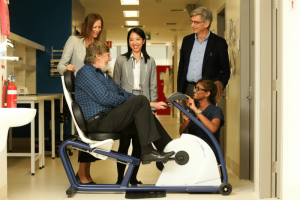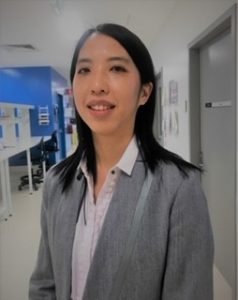Prostate cancer is the most commonly diagnosed cancer in men. One in seven men will be diagnosed by the age of 85 years.
For many men who have active treatment for prostate cancer, hormone therapy (also called androgen deprivation therapy) will be recommended.
Androgen deprivation therapy works by reducing levels of the hormone testosterone. This is important – as testosterone increases the growth of prostate cancer. Reducing testosterone levels with this therapy means the chance of the cancer spreading is significantly reduced.
Unfortunately, though, androgen deprivation therapy has several possible side effects. These include loss of libido (or sex drive), erectile difficulties, increased weight, reduced strength, increased fatigue and a reduction in quality of life. It can also lead to the development of other health conditions, like insulin resistance and type 2 diabetes.
Because of these side effects, the American College of Sports Medicine recommends that any man taking androgen deprivation therapy should take part in regular physical activity1. This is because physical activity can help improve mental health, decrease weight, improve muscle strength and reduce fatigue.

A form of exercise that has been found to improve muscle loss associated with ageing in older men and women is progressive resistance training. This type of training involves challenging the muscles with unaccustomed and increasingly heavier loads.
Researching the effects of progressive resistance training for men with prostate cancer
Dr Teresa Lam, the winner of the 2019 Endocrine Society of Australia’s Bryan Hudson Clinical Endocrinology Award, has been exploring whether progressive resistance training can prevent the adverse side effects for men with prostate cancer when they start their androgen deprivation therapy.
Her research specifically looked at the benefits of a home-based program. This provided an easy and cheaper option for men than attending clinics, which meant it would likely be easier to do and more accessible for many men.
The 25 men who participated in her study were randomised to receive either 60 minutes of progressive resistance training three times a week for 12 months when they started their androgen deprivation therapy, or receive usual care (androgen deprivation therapy alone). The resistance training included a program of handheld weights and push-ups.
Before entering the study and again at 6 weeks and 12 months, measurements were taken to assess quality of life, body composition (weight, fat mass, lean body mass), bone density and insulin resistance.

Dr Teresa Lam (centre) with a participant in the study and her research supervisors.
At 12 months, Dr Lam found that the progressive resistance training had offset the negative effects of androgen deprivation therapy.
“The results were very positive,” explains Dr Lam.
“We found the changes in body composition that normally occur with androgen deprivation therapy were prevented by regular engagement in physical activity.”
“More importantly, we also observed an improvement in quality of life, as reported by the men taking part in the combined androgen deprivation therapy and exercise program”.
An improvement in insulin sensitivity was also found as early as 6 weeks after starting the program.
These results are very promising for men who need androgen deprivation therapy to stop the growth and spread of prostate cancer. While this therapy is an important part of prostate cancer treatment for many men, the negative side effects can cause serious changes in lifestyle and overall health.
Finding effective ways to reverse the side effects will improve quality of life for many men during this difficult and stressful time.
About Dr Teresa Lam

Dr Lam is working to improve health outcomes for people with cancer and diabetes.
Dr Teresa Lam is an endocrinologist at Westmead Hospital. Her area of interest is in the association between diabetes and cancer risk, and potential therapies to reduce this risk. She graduated with a Bachelor of Medicine degree from the University of New South Wales and underwent basic physician training at Royal North Shore Hospital and advanced training in endocrinology at Westmead Hospital. In 2015, she started her PhD with research conducted at the Metabolic Research Unit at Blacktown Hospital with support from the Crown Princess Mary Cancer Centre, Westmead Hospital. She plans to submit her PhD thesis early next year and hopes to continue research in the area of diabetes and cancer, both of which represent significant public health burdens.
Dr Lam received the Bryan Hudson Clinical Endocrinology Award, which recognises the best clinical research presentation at the annual scientific meeting of the Endocrine Society of Australia.
Dr Lam has no conflicts of interest or funding support to declare.
References
- Schmitz KH et al American College of Sports Medicine round table on exercise guidelines for cancer survivors Med Sci Sports Exerc. 2010.







